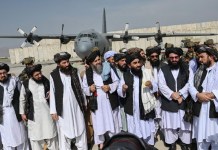Pakistani experts and leaders continue to blame India for Sunday’s terror attack in Balochistan although ISIS admitted to killing 11 coal miners belonging to the minority Shia Hazara community.
Has Balochistan Toppled Kashmir To Emerge As The Most Dangerous Place In South Asia?
Armed militants abducted the 11 coal miners from the Mach area of Bolan district in Balochistan, while they were on the way to work and shot them dead in the nearby mountains. Authorities probing the incident said the terrorists picked the 11 people belonging to the Shia Hazara community and killed them while others were left unharmed, Dawn said in a report.
The incident took place in the remote Mach area of the southwestern Balochistan province, a key route to the China-Pakistan Economic Corridor (CPEC) project, according to Murad Kaas, the deputy commissioner of the provincial capital Quetta.
The report further said that the people from the Hazara community in Quetta blocked the highway in protest of the killings. “Have asked the FC [Frontier Corps] to use all resources to apprehend these killers & bring them to justice. The families of the victims will not be left abandoned by the govt,” Pakistan Prime Minister Imran Khan said in a tweet.
The condemnable killing of 11 innocent coal miners in Machh Balochistan is yet another cowardly inhumane act of terrorism. Have asked the FC to use all resources to apprehend these killers & bring them to justice. The families of the victims will not be left abandoned by the govt
— Imran Khan (@ImranKhanPTI) January 3, 2021
The Islamic State claimed the responsibility for the attack through its Amaq news agency via its Telegram communications channel, Reuters said in its report. The Hazara community is a minority in Pakistan and Afghanistan and has been persecuted for decades. It accounts for at least 19 percent of the population of Afghanistan and over 65,000 are residents of Pakistan, mostly living in Quetta.
The Hazaras belong to the Shia community, which is a minority in the Sunni-dominated Pakistan and Afghanistan. They have been the target of extremists organizations including the Taliban and the Islamic state from time to time.
The last attack was reported in April 2019 when a suicide bomber killed about 21 people, mostly people from the Hazara community, in an open market in Balochistan.
Pakistani Leaders and Experts Target India
Several Pakistani leaders and experts have continued to claim India’s role in attacks in Balochistan. The region that shares borders with Afghanistan and Iran has been battling extremist violence for years now.
Following the attack on coal miners, Pakistan’s Minister for Human Rights Shireen Mazari blamed the “Indian-funded terrorists” in Balochistan. “Indian funded terrorists in Balochistan getting more desperate as development comes to province,” she tweeted.
Terrorists now target poor coal miners in Machh Balochistan – murdering 11 & seriously wounding 4. Indian funded terrorists in Balochistan getting more desperate as development comes to province. Socio econ empowerment & Insaf for the Baloch are how we will defeat the terrorists.
— Shireen Mazari (@ShireenMazari1) January 3, 2021
Brig. (Retd.) Mehmood Shah, a security and defense analyst, claimed that the Indian Army is “highly unprofessional as it is directly targeting the civilians at LoC and using rape as a weapon of war in Indian illegally occupied Jammu and Kashmir.”
“I have no qualms in saying that Indian aggression aimed at Pakistan will be responded with full might. Kashmiris now have a strong belief that India can no longer be trusted,” Shah told public broadcaster Radio Pakistan.
On the other hand, Amjad Ayub Mirza, a political activist from Pakistan administered Kashmir, has alleged a “genocide of Hazara Shias” at the hands of the Pakistan Army. He urged Indian Prime Minister Narendra Modi, in a video message, to “ensure freedom of Balochistan and Pakistan Occupied Kashmir from Pakistan, news agency ANI reported.
Maj. Gen. (Retd.) Ijaz Awan, another Defense Analyst, told Pakistan Radio that through the India-US deal, India is using satellites to “hit targets” in Pakistan, and “use of modern technology is mandatory to counter such cowardly attacks by India.”
“The nefarious Indian designs have gained extra momentum since the start of China-Pakistan Economic Corridor, as New Delhi is deeply envious of Pakistan gaining financial stability. India has been supporting proxies against Pakistan armed forces, paramilitary forces, civilians and to attack ongoing projects in Balochistan,” he said in the report.
Maj. Gen. (Retd.) Ijaz Awan, a defense expert, argued that stricter actions against the terrorists should be taken to curb the menace of terrorism from its roots. He claimed that the “apprehended Indian spy Kulbhushan Jadhav was one of the Indian commanders deputed to create instability in Balochistan.”
“There could be many more such elements and our intelligence agencies need to expose these culprits. There needs to be a befitting response from Pakistan against the Indian aggressive acts,” he said to Pakistan Radio.
Islamabad has accused India of supporting the insurgents in the region by training and funding the Baloch Republic Army (BLA), a separatist group. Reportedly, the Baloch people have been struggling to gain independence from the Pakistan occupation and have expressed solidarity with India on several occasions.
Prime Minister Imran Khan has blamed India on several occasions by insinuating “India-backed soldiers” operating in Balochistan.
Follow EurAsian Times on Google News




